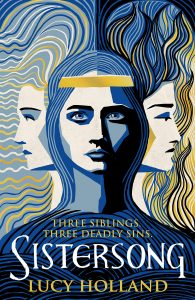Sistersong by Lucy Holland – Book Review
Published by Macmillan
Genre: historical fantasy
Pages: 416 (Hardcover)
Format: ebook
Review Copy: Thanks to Black Crow PR for approving me on NetGalley.
 In Sistersong, Lucy Holland tackles themes ranging from gender identity in an increasingly binary world to family, loyalty, and love, to the encroachment of a religion whose values are at odds with those of the majority of Brittons. What I didn’t know (and learned from fellow contributor Jonathan Thornton’s review) is that elements of Sistersong are also based on a ballad, “The Twa Sisters”. That Holland does justice to all these themes while incorporating the narrative thread of the ballad is commendable. The spirit of this older tale lives on in Sistersong, its elements seamlessly interwoven with the structure of a compelling tale about identity denied and reaffirmed.
In Sistersong, Lucy Holland tackles themes ranging from gender identity in an increasingly binary world to family, loyalty, and love, to the encroachment of a religion whose values are at odds with those of the majority of Brittons. What I didn’t know (and learned from fellow contributor Jonathan Thornton’s review) is that elements of Sistersong are also based on a ballad, “The Twa Sisters”. That Holland does justice to all these themes while incorporating the narrative thread of the ballad is commendable. The spirit of this older tale lives on in Sistersong, its elements seamlessly interwoven with the structure of a compelling tale about identity denied and reaffirmed.
I cannot speak to the veracity of the world from a historical perspective—unfortunately, my knowledge of sixth century Britain and Dumnonia in particular is not up to snuff. The big strokes, I’m familiar with—Saxons encroaching on Briton lands, pillaging and raping and making themselves at home; as an aside, if you want to entertain yourselves, you’re welcome to look at the way older English history textbooks talk about this settlement process as opposed to newer ones, there’s quite the linguistic difference. Back to Sistersong: What I can attest to is that this text offers the reader a feeling of verisimilitude in the way the world is portrayed, as well as in the dual conflicts at display here.
The siblings’ relationship is at the core of the emotional impact this book will have on you. This is the story mainly of Keyne, whose struggle to be seen as a man despite being born in a woman’s body is a rewarding tale of hardship, growth, and self-assertion. Keyne is the middle sibling to Riva and Sinne, who each struggle with the changing world around them in their own way. Riva’s natural abilities as healer are great; but when she falls in love with a handsome stranger, her loyalties are tested to the breaking point. Sinne, the youngest of the three, has talents of her own—and finds a friend unlike any she thought she would. The dynamics between the three make for some excellent twists, especially in the last third of the novel. I wasn’t as emotionally entangled in this story as I would have liked – the characters, though I enjoyed the writing behind them, did not connect with me the way those in, say, A Wind from the Wilderness did (another great historical fantasy). That’s a purely subjective issue, however, and it should not take away from your willingness to give Sistersong a chance—it’s a remarkable novel whose multitude of moving parts takes the breath away.
Without introducing spoilers, I’ll say also, I find the choice of the name “Constantine” to be of particular interest, as it was Constantine the Great who officially adopted Christianity as state religion. To have another Constantine to stand in the path of a Christian priest is a stroke of irony I appreciate. There’s plenty more I appreciate about Sistersong, despite my inability to connect with the main characters; I thought the pacing was very well done, and the stakes were at just the right level through the different parts of the novel, going from the intimate and personal to the overarching theme of a socio-cultural encroachment. It’s well-worth reading for yourselves!
